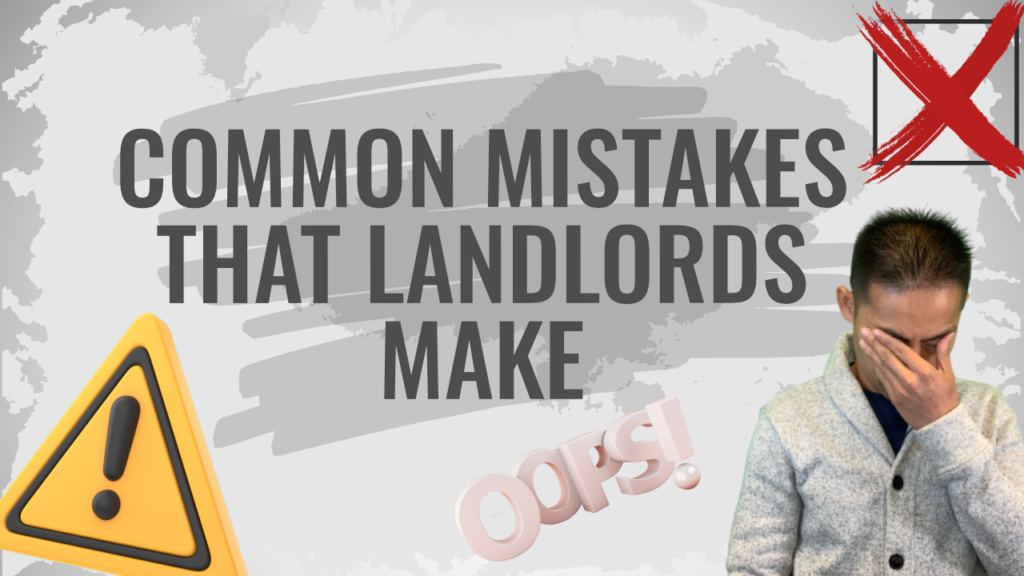Avoid these Common Landlord Mistakes
Reading Time: 3 minutes Mistakes after mistakes after mistakes can be done. A property manager’s job is to help you minimize common landlord mistakes and more importantly, avoid them before they even happen. Here are three of those common mistakes and why you should prevent them. #1 Not recognizing the importance of planning First and foremost, prior…

Mistakes after mistakes after mistakes can be done. A property manager’s job is to help you minimize common landlord mistakes and more importantly, avoid them before they even happen. Here are three of those common mistakes and why you should prevent them.
#1 Not recognizing the importance of planning
First and foremost, prior planning prevents poor performance. We say this because we want to make sure you get a good tenant in the unit. We hear all these nightmares of tenants not paying rent or breaking things. Complaint after complaint about the tenant, it is the people that you put into the unit.
We interview every single tenant. Knowing the right questions to ask when qualifying them, we make sure to cover and emphasize the following points:
- a strong income, at least three times the monthly rent
- a fair credit score, we use 640
- for any type of pet that we allow, they must pass our pet screening process

You need to have a process for all these things and don’t bend on it. A tenant-applicant can seem like a really nice person and can undergo an interview well. But at the end of the day, the numbers on their income and credit scores don’t lie. They can be the greatest people in the world, but then at the end of the day, they need to have the qualifications.
Once you put a bad tenant into your unit, it will be a nightmare to get them out.
#2 Deferring maintenance

Deferred maintenance really costs you more money in the long run. Sometimes, the smallest of issues get ignored. “Oh, it’s just a little drip into my house.” That drip will turn into a leak, which leads to mold. Mold means sickness and tenants complaining. Complaints get the city having to be involved.
You want to make sure that you have someone going through your property: making sure handrails are tight, there are no loose steps or any type of issues that causes you liability and a lawsuit.
3# Not handling the financials properly

Speaking of lawsuits, the number one thing that landlords get sued about in the state of Massachusetts is mishandling of security deposits. Security deposits need to be held in a separate interest-bearing escrow account, and that is an account that has nothing to do with your money. That account has to be opened under the tenant’s name and ID, and the interest every year that gets accrued. Even if the amount is as low as three pennies, it needs to be sent back to them with a statement.
Furthermore, you need to open up this account within 30 days and build a return on that security deposit within 30 days again if the tenants vacate.
Our commitment
If you or anyone else you know is looking for a proactive property manager to help you avoid these common landlord mistakes in the first place, please think of Green Ocean Property Management: where you get more than a property manager, you get peace of mind.
How Does Our Business Referral Program Works?
Reading Time: 3 minutes We know that there are a lot of fears when real estate agents refer their clients to anybody. Well, let us explain to you why that would never happen with Green Ocean Property Management and the benefits of working with us to help your clients out with more transactions. What we will do…
Efficient Shower Repair with Green Ocean Property Management
Reading Time: 3 minutesIn the world of plumbing and property management, it’s essential to have a reliable team that can efficiently tackle issues as they arise. We will share the encounter with one of our favorite Green Ocean Property Management plumbers, witnessing their proactive and cost-effective approach to solving a common problem; a leaking pipe behind a fully…
How We Save Money on Water
Reading Time: 2 minutes Water is precious, and conserving it is good for the environment. But saving money on water bills benefits your wallet as well. Today, we are excited to share with you yet another way that we at Green Ocean Property Management can help you save more money with your investment property. Our Water Bill…








